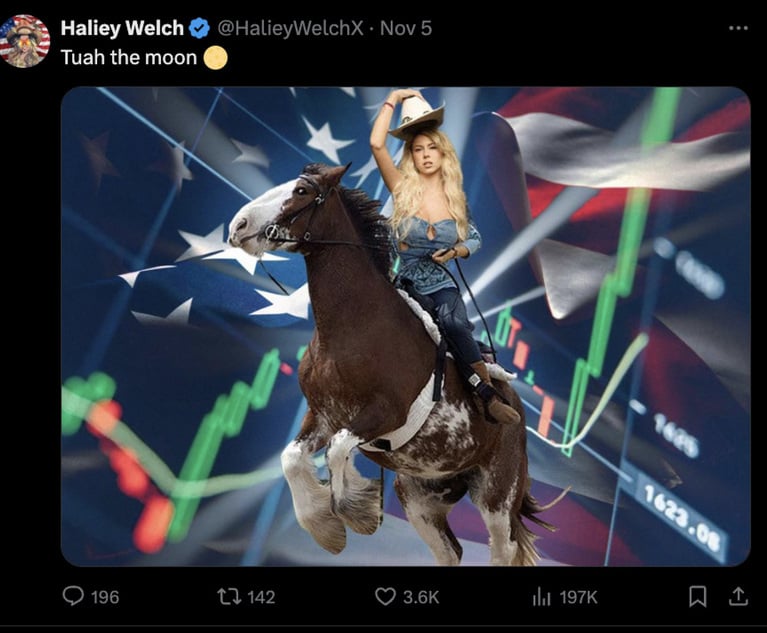 Aaron Solomon, left, and Alisha Talati, right, of Kaufman Dolowich. Courtesy photos
Aaron Solomon, left, and Alisha Talati, right, of Kaufman Dolowich. Courtesy photosStanding on Less Shaky Ground: 'Guthrie' Decision Impact on NY Wage and Hour Matters
Guthrie not only increases the threshold for establishing “concrete harm” for standing purposes, it also notes that the mere fact that a person’s ability to pursue enforcement of a statutorily guaranteed right does not automatically confer standing in other matters.
November 13, 2024 at 09:14 AM
7 minute read
The U.S. Court of Appeals for the Second Circuit’s recent decision in Guthrie v. Rainbow Fencing, 2024 WL 3997427 (2d Cir. Aug. 30, 2024) will make it more difficult for employees to allege Article III standing in federal court to pursue claims under the New York Wage Theft Prevention Act (WTPA). Further, even though Guthrie addressed WTPA claims, it will also have broader implications with respect to the burden that must be satisfied to establish Article III standing. In fact, Guthrie not only increases the threshold for establishing “concrete harm” for standing purposes, it also notes that the mere fact that a person’s ability to pursue enforcement of a statutorily guaranteed right does not automatically confer standing in other matters.
By way of background, pursuant to the WTPA, which is part of the New York Labor Law, employers are required to provide wage notices to employees at time of hire and wage statements with each payment of wages. See NYLL Sections195(1), and 195(3). Noncompliance can result in lawsuits that can be quite costly for employers. An employer’s failure to provide wage statements results in a maximum $5,000 civil penalty per employee plus attorney’s fees. An employer’s failure to provide wage notices also results in a maximum $5,000 civil penalty per employee plus attorney’s fees. Thus, if both wage statements and wage notices violations exist, an employer can face the possibility of liability for civil penalties of up to a maximum of $10,000 per employee plus attorney fees. An employer has two possible affirmative defenses to wage statement and wage notice claims. Under New York Labor Law Sections 198(1-b) and 198(1-d), an employer can avoid liability if it can prove that it made complete and timely payment of all wages due or that it reasonably believed in good faith that it was not required to provide employees with wage statements and notices. However, these defenses are difficult to prove, especially in a class action.
In federal court, WTPA claims can be asserted on a class action basis if standing under Article III is established. Because each member of the class could recover civil penalties individually, the exposure associated with WTPA claims can dwarf the amount of unpaid wages that the entire class could recover. However, New York state courts have held that these claims cannot be asserted in state court on a class basis because Article 9 of the Civil Practice Law and Rules (CPLR) precludes the recovery of penalties. Therefore, the plaintiffs bar is keenly interested in ensuring that Article III standing for WTPA claims can be easily established and the defense bar certainly wants to make sure that the burden to establish standing for wage statement and wage notice claims is more significant.
In TransUnion v. Ramirez, 141 S. Ct. 2190, 2205 (2021) the U.S. Supreme Court reshaped the analysis of standing under Article III when it held that a mere deprivation of information to which a Plaintiff claims entitlement, without more, is not a concrete harm for standing purposes. Specifically, a purported “informational injury that causes no adverse effects” does not satisfy Article III’s injury-in-fact requirement. Instead, a plaintiff must allege “‘downstream consequences’ from failing to receive the allegedly required information.”
The Second Circuit previously applied TransUnion’s analysis in Maddox v. Bank of New York Mellon Trust , 19 F.4th 58 (2d Cir. 2021) outside the context of employment-related claims. In Maddox, a putative class of mortgagors brought an action against a mortgagee, Mellon Trust Company, N.A. (Mellon), alleging, amongst other claims, that Mellon’s failure to timely record the mortgagors’ satisfaction of mortgages after discharge of the mortgage violated New York’s mortgage-satisfaction recording statutes. There, the Second Circuit found that the mortgagors lacked Article III standing to pursue statutory penalties in federal court. Specifically, although the mortgagors identified several potential harms that could occur because of delayed recording, the mortgagors failed to sufficiently plead that they suffered any actual injury and thus, there no standing was conferred.
In the years following TransUnion, courts in the Second Circuit applied the Supreme Court’s analysis to WTPA claims in divergent ways. Some courts followed TransUnion by determining that the failure to provide wage statements and notices are nothing more than “informational injuries,” which are insufficient to establish Article III standing. Other courts held that standing existed if it was alleged that the employer’s failure to provide the documents deprived the plaintiff of the ability to advocate for unpaid wages. Certain courts even held that a separate, concrete injury is not required in order to establish Article III standing for WTPA claims.
In the pivotal decision of Guthrie, the Second Circuit finally provided some measure of clarity by applying TransUnion to hold that a plaintiff must connect an employer’s failure to comply with the WTPA to some articulable downstream harm to establish standing. Otherwise, the Plaintiff merely alleges an insufficient “informational injury.” The Second Circuit specifically held that merely alleging that an employer failed to provide notices and wage statements or claiming that said failure deprived the employee’s ability to “advocate” for their unpaid wages does not articulate “downstream harm.” To articulate such harm, the employee must allege a “plausible ‘theory as to how the employee was injured by the defendants’ failure to provide the requisite documents.’” Notably, Guthrie does not explicitly determine what constitutes “downstream harm” sufficient to establish standing for WTPA claims. However, Guthrie does take note of certain district court decisions addressing alleged “downstream harm” including one case where it was claimed that the failure to provide accurate wage statements deprived an employee of the ability to determine the precise number of hours for which the employee should have been paid. Therefore, the employee was apparently harmed by being deprived of income for longer than the employee would have been had the employee been able to timely raise their concerns about underpayment earlier.
Although Guthrie will surely have significant impact on wage and hour litigation because it forces plaintiffs to connect a WTPA violation to a discrete harm, its reach may not end there. For example, Guthrie also indicates that Article III standing does not automatically exist just because a statute grants a person a right and purports to authorize the person to sue to enforce that right. In addition, Guthrie establishes that general harm that might be experienced from a statutory violation is insufficient. In other words, “possible injuries” are not good enough. Even though Maddox reflects the same conclusion, Guthrie further increases or clarifies the burden for establishing Article III standing. Simply put, Guthrie may impact many kinds of litigation. However, it remains to be seen how far the Second Circuit’s game-changing decision in Guthrie will extend and practitioners should take note of its effect on the analysis of Article III standing.
Aaron Solomon is a labor and employment partner in the Woodbury, New York office of Kaufman Dolowich. He advises a variety of businesses in matters involving discrimination, harassment, and retaliation and represents clients in myriad labor and employment disputes including collective and class action wage and hour lawsuits. Aaron also works with businesses to ensure that they remain in compliance with employment laws and regulations.
Alisha Talati is an associate with the firm. She concentrates her practice in labor and employment law, representing clients in all aspects of employment litigation including collective and class action wage and hour disputes. Talati also provides advice and counsel to businesses in various industries.
NOT FOR REPRINT
© 2024 ALM Global, LLC, All Rights Reserved. Request academic re-use from www.copyright.com. All other uses, submit a request to [email protected]. For more information visit Asset & Logo Licensing.
You Might Like
View All
Preemptive Litigation: A Potential Approach for a Precise Situation
13 minute read


‘Hawk Tuah Girl’ $440 Million Meme Coin Collapse Sparks Legal Battle
4 minute readTrending Stories
Who Got The Work
Michael G. Bongiorno, Andrew Scott Dulberg and Elizabeth E. Driscoll from Wilmer Cutler Pickering Hale and Dorr have stepped in to represent Symbotic Inc., an A.I.-enabled technology platform that focuses on increasing supply chain efficiency, and other defendants in a pending shareholder derivative lawsuit. The case, filed Oct. 2 in Massachusetts District Court by the Brown Law Firm on behalf of Stephen Austen, accuses certain officers and directors of misleading investors in regard to Symbotic's potential for margin growth by failing to disclose that the company was not equipped to timely deploy its systems or manage expenses through project delays. The case, assigned to U.S. District Judge Nathaniel M. Gorton, is 1:24-cv-12522, Austen v. Cohen et al.
Who Got The Work
Edmund Polubinski and Marie Killmond of Davis Polk & Wardwell have entered appearances for data platform software development company MongoDB and other defendants in a pending shareholder derivative lawsuit. The action, filed Oct. 7 in New York Southern District Court by the Brown Law Firm, accuses the company's directors and/or officers of falsely expressing confidence in the company’s restructuring of its sales incentive plan and downplaying the severity of decreases in its upfront commitments. The case is 1:24-cv-07594, Roy v. Ittycheria et al.
Who Got The Work
Amy O. Bruchs and Kurt F. Ellison of Michael Best & Friedrich have entered appearances for Epic Systems Corp. in a pending employment discrimination lawsuit. The suit was filed Sept. 7 in Wisconsin Western District Court by Levine Eisberner LLC and Siri & Glimstad on behalf of a project manager who claims that he was wrongfully terminated after applying for a religious exemption to the defendant's COVID-19 vaccine mandate. The case, assigned to U.S. Magistrate Judge Anita Marie Boor, is 3:24-cv-00630, Secker, Nathan v. Epic Systems Corporation.
Who Got The Work
David X. Sullivan, Thomas J. Finn and Gregory A. Hall from McCarter & English have entered appearances for Sunrun Installation Services in a pending civil rights lawsuit. The complaint was filed Sept. 4 in Connecticut District Court by attorney Robert M. Berke on behalf of former employee George Edward Steins, who was arrested and charged with employing an unregistered home improvement salesperson. The complaint alleges that had Sunrun informed the Connecticut Department of Consumer Protection that the plaintiff's employment had ended in 2017 and that he no longer held Sunrun's home improvement contractor license, he would not have been hit with charges, which were dismissed in May 2024. The case, assigned to U.S. District Judge Jeffrey A. Meyer, is 3:24-cv-01423, Steins v. Sunrun, Inc. et al.
Who Got The Work
Greenberg Traurig shareholder Joshua L. Raskin has entered an appearance for boohoo.com UK Ltd. in a pending patent infringement lawsuit. The suit, filed Sept. 3 in Texas Eastern District Court by Rozier Hardt McDonough on behalf of Alto Dynamics, asserts five patents related to an online shopping platform. The case, assigned to U.S. District Judge Rodney Gilstrap, is 2:24-cv-00719, Alto Dynamics, LLC v. boohoo.com UK Limited.
Featured Firms
Law Offices of Gary Martin Hays & Associates, P.C.
(470) 294-1674
Law Offices of Mark E. Salomone
(857) 444-6468
Smith & Hassler
(713) 739-1250






